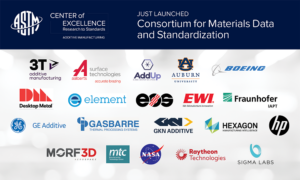
ASTM International Additive Manufacturing Center of Excellence (AM CoE) and the founding industry members, including Aalberts surface technologies-accurate brazing, are formally announcing the launch of the AM CoE Consortium for Materials Data and Standardization (CMDS) initiative. The mission of ASTM’s CMDS is to bring key organizations together from across a broad range of industries representing the entire AM value stream. The consortium members will collaborate on standardization of the requirements for AM materials data generation and will create and manage shared high pedigree “reference” datasets needed to accelerate qualification and greater adoption of AM technologies. The consortium is being launched with 21 founding members including:
- Aalberts surface technologies-accurate brazing
- AddUp Inc.
- ASTM International
- Auburn University
- BeamIT/3T-AM Ltd.
- Boeing
- Desktop Metal
- Element Materials Technology
- EOS
- Edison Welding Institute (EWI)
- Fraunhofer IAPT
- Gasbarre Thermal Processing
- GE Additive
- GKN Additive
- Hexagon Manufacturing Intelligence, Inc.
- HP Inc.
- Manufacturing Technology Center
- Morf3D
- National Aeronautics and Space Administration (NASA)
- Raytheon Technologies Corporation
- Sigma Labs, Inc.
The CDMS approach is particularly focused on determining key process-structure-property relationships necessary to develop methods for generating machine agnostic materials data. The CMDS will curate a shared database of high-pedigree data that will be used by consortium members to develop the tools, such as physics-based/probabilistic models, and data analytics needed to support rapid qualification of new AM applications, materials and technologies and real-time Quality assurance to scale AM production.
Each year, under the direction of the industry members and in coordination with key regulatory bodies and other government agencies, the CMDS will select materials and application specific properties (e.g., static, cyclic, thermal, corrosion) of interest and execute various projects that ultimately support the development of standards and datasets. While members retain exclusive use of the full datasets to support their business, research output and lessons learned will inform new AM standards and specifications developed through the ASTM related committees such as F42 to drive consistency across the industry, creating new and improved materials specifications with property and structure requirements based on robust datasets.
